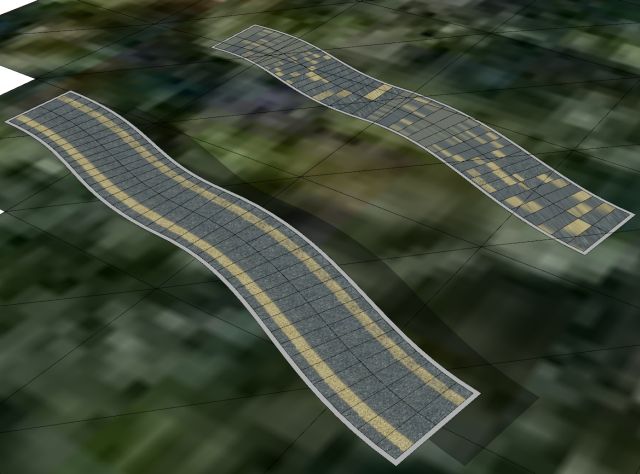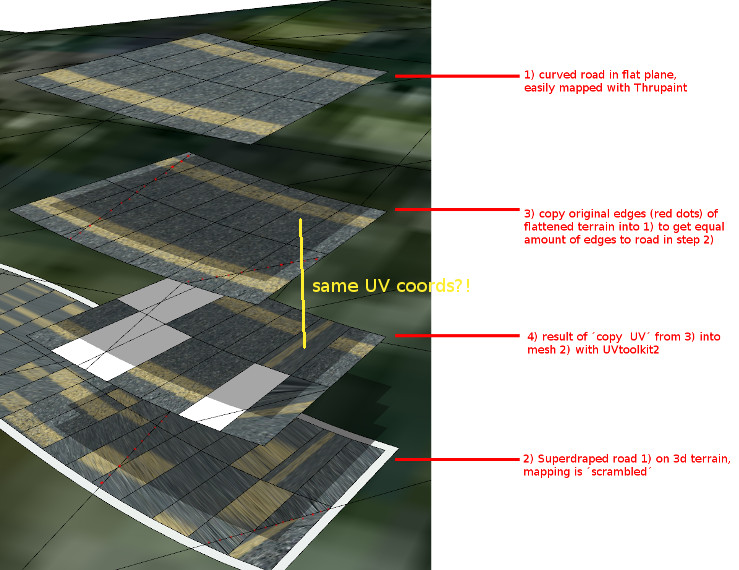[Plugin] Super Drape
-
@box said:
It's not the install extension section I was referring to. In the box above the install extension button you need to see super drape there and tick it's box.
That just did the trick and it was the only place I didn't check a second time - so thank you very much!
-
Any vid/tuts about using this? Can't get this to work....
-
Please be less cryptic.
How isn't it working ?
Is it installed OK ?
Did you follow the guidance and image in the first post/download thread... ?Reiterated:
You need two groups.
The draper-group must be located above the receiving group.
Its faces are replicated, projected onto the receiver's surfaces, maintaining the materials.Possible issues:
The draper/receiver geometry contain tiny edges or facets that can't be intersected using SketchUp's methods, simply because of its tolerances [~1/1000"] - where the start & ends of a tiny line are deemed to occupy the same point in space and so the edge won't form, and then its related face can't form.
Scale up both drape and scale-down - tiny edges can exist but cannot be created [this is the same issue with Sandbox-Drape]
View the groups in Monochrome mode with a distinctive back-face material.
If any 'backs' are facing up in either group you will get unexpected results.
The edges might drape successfully, but then it seems like the draped materials are missing - they are not, they are just on the 'underside' [front] of the faces in the receiver. The materials on the draper's face-fronts will be used and of course this might not be the top-side you expected, if faces are wrongly oriented. -
-
The problem with that one is that it is rotated. The small group's blue axis is running along the green axis, therefore it is "Draping" in the wrong direction. If you explode and regroup it it will work. Orientation is the key.
As a side note it's worth pointing out that you have drawn it outside and under the ground plane, not that this is causing your problem.
-
Thanks for the tip man!
-
I'm trying to get an effect where I'm draping roads, parking lots, etc. ONTO the imported google earth terrain. Super Drape and Drape both take the top group and "cut" it onto the TIN of the terrain. What I'm looking for is something that will drape the roads and so forth, onto the TIN below, but stay a completely separate group. In this way I can still control layers, etc.
Also, with Super Drape, I'm not getting the top donor materials to "take" in the google earth terrain. I get generic "white" skin where the new faces are cut.
I'd appreciate any comments or help. thanks!
-
I tried to answer in your other post that I think you want the Stamp tool in the Sketchup Sandbox Tools. But I could be wrong.
-
Are your faces upside down ?
Either in the mesh or the 'road' your are trying to project 'down'...
Use a Style with a distinctly color back-face - say bright-blue or magenta.
Now view in Monochrome mode...If you see that when it should be a front color you have some 'reversing' to do...

-
Is it true that Supderdrape doesn't work in 2014 when installing it with the PluginStore manager? I can't see it anywhere
 !
! -
...I found it...you'll have to active the toolbar in the extensions-list in the preferences window. mmmm
-
It already worked in v2014... but FTAO I've relaunched it as v3.2 http://sketchucation.com/forums/viewtopic.php?p=358314#p358314
New version now in the PluginStore http://sketchucation.com/pluginstore?pln=SuperDrape -
Could I ask for some help? I'm trying to drape a textured road on a terrain mesh. Using Super Drape the resulting mapping coordinates are messed up somehow.
Already checked: units, regrouped both, edge inspector results in no errors, face normals are ok, removed smoothing and all edges are visible. I have no idea why it doesn't work.
Any help would be appreciated.
kind regards, Max

-
I confirm I get similar results.
The UV-mapping of the upper faces' textures should be transferred to the facets in the draped version, with adjustments for their relative normal angles: but clearly this is not happening...I will investigate...
-
@tig said:
I confirm I get similar results.
The UV-mapping of the upper faces' textures should be transferred to the facets in the draped version, with adjustments for their relative normal angles: but clearly this is not happening...I will investigate...
Great Tig! Just wondering, the terrain uses projected textures - cause of problem maybe?
-
It may be a projected texture issue...

How did you apply/edit the textured 'yellow stripe' material on the 'flat' faces ?
I found that if I added the material afresh and used Texture and/or My Texture Tools Plugin to adjust its rotation/position I could then get it to SuperDrape acceptably - see the first 6 facets in the screen-shot - I defaulted the next two facets to show the differences between my effort and your original

-
@tig said:
It may be a projected texture issue...

How did you apply/edit the textured 'yellow stripe' material on the 'flat' faces ?I applied the texture using Fredo's ThruPaint. By doing so the mapping for the entire road is aligned to the curves of the road in just 2 mouse clicks.
@tig said:
I found that if I added the material afresh and used Texture and/or My Texture Tools Plugin to adjust its rotation/position I could then get it to SuperDrape acceptably - see the first 6 facets in the screen-shot - I defaulted the next two facets to show the differences between my effort and your original

Tig, thanks for your time and effort. This method sounds a bit more time consuming. Will try as well.
-
So maybe ThruPaint is messing with the UV-mapping in a way that SuperDrape can't unravel into a suitable way onto the surface?
Can you use it to reverse engineer the problem after SuperDraping ? -
@tig said:
So maybe ThruPaint is messing with the UV-mapping in a way that SuperDrape can't unravel into a suitable way onto the surface?
Can you use it to reverse engineer the problem after SuperDraping ?The draping proces changed (divided) the mesh in such a way ThruPaint doesn't pick up any quads anymore so using that result in a mess. Trying to figure out some workarounds...
edit: tried copying UV with UV toolkit but didn't work. I guess due to the difference in vertex count.
edit2: exporting the original flat road as 3ds / dae reports: 80 different textures are being made. Importing that 3ds / dae results in 80 different materials for the road. One for each face. Strange..
edit3: exporting the draped UV's to roadkill is no solution either. Even after welding it doesn't look good and individual points can't be moved.
-
Had another go at trying to find some workflow to get roads, rivers, ponds or any textured flat custom shape into a 3d terrain mesh (or actually into any 3d mesh - otherwise I could just as easily buy instantRoad).
I tried copying the edges of a flattened version of the original terrain into the original textured flat road so the number of faces and edges would be the same as in the superdraped road. I hoped I could then use UVtoolkit2 to copy the uv coords of (3) into (2) but it didn't work at all (see result 4).
I wanted to know if there's something strange happening with the UV coordinates so I had a go at ruby and google-searched-copy-pasted some code to investigate them:
ss = Sketchup.active_model.selection @tw = Sketchup.create_texture_writer side = true hash = {} ss.each do |i| next unless i.class == Sketchup;;Face uv_helper = i.get_UVHelper(true, false, @tw) i.vertices.each{|v| p = v.position uv = (side)? uv_helper.get_front_UVQ(p) ; uv_helper.get_back_UVQ(p) uv.x /= uv.z; uv.y /= uv.z; uv.z = 1 hash[v] = [] if !hash[v] hash[v] << uv puts ("ux=" + uv.x.to_s + " uy=" + uv.y.to_s) } endI hoped for some really strange results but I'm no export on the UV coordinates so I have no idea what I'm looking for. What's strange though is that some faces have the same UV coords but still look different (see picture).
I hope somebody has a clue what to do...

Advertisement








